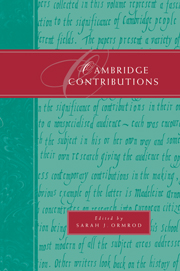Book contents
- Frontmatter
- Contents
- Notes on contributors and contributions
- Preface
- 1 Some Cambridge contributions to astronomy and cosmology
- 2 Cambridge's contribution to medical science
- 3 Cambridge and the study of English
- 4 The Cambridge contribution to economics
- 5 ‘Nasty forward minxes’: Cambridge and the higher education of women
- 6 Cambridge Classics for the third millennium
- 7 Cambridge contributions: the philosophy of science
- 8 European citizenship and education
- 9 The University Botanic Garden
- 10 Geophysics in Cambridge: extinct and active volcanoes
- 11 Cambridge spies: the ‘Magnificent Five’, 1933–1945
1 - Some Cambridge contributions to astronomy and cosmology
Published online by Cambridge University Press: 31 December 2009
- Frontmatter
- Contents
- Notes on contributors and contributions
- Preface
- 1 Some Cambridge contributions to astronomy and cosmology
- 2 Cambridge's contribution to medical science
- 3 Cambridge and the study of English
- 4 The Cambridge contribution to economics
- 5 ‘Nasty forward minxes’: Cambridge and the higher education of women
- 6 Cambridge Classics for the third millennium
- 7 Cambridge contributions: the philosophy of science
- 8 European citizenship and education
- 9 The University Botanic Garden
- 10 Geophysics in Cambridge: extinct and active volcanoes
- 11 Cambridge spies: the ‘Magnificent Five’, 1933–1945
Summary
INTRODUCTION
Out of every 10,000 people, 9,999 have something in common: their professional concerns lie on or near the Earth's surface. The ‘odd one out’ is an astronomer. But a poll taken on King's Parade would yield a higher-than-average chance of finding astronomers: the proportion would still be tiny, maybe one in five hundred, but this is enough to establish Cambridge as a major centre for research in this subject.
SOME EARLY HISTORY
Cambridge's astronomical tradition dates back, of course, to Newton in the seventeenth century. No subsequent individual in the University (nor, perhaps, anywhere in the world of science) has matched his extraordinary gifts and singular achievements. But the tradition in theoretical and mathematical astronomy has been sustained by a succession of eminent names, through to Eddington, Hoyle, and Hawking in the present century.
Cambridge's contributions to the observational side of the subject date back almost as far. In 1702, the Reverend Thomas Plume, Vicar of Maiden, in Essex, left his estate to maintain a studious and learned Professor of Astronomy & Experimental Philosophy, and to buy him and his successors books and instruments, Quadrants, Telescopes … so as any ingenious Scholars or Gentlemen may resort to him in the proper seasons to be instructed and improved by him in knowledge of Astronomy, the Globes, Navigation, Naturall Philosophy, Dialling & other practical parts of the Mathematicks.
- Type
- Chapter
- Information
- Cambridge Contributions , pp. 1 - 20Publisher: Cambridge University PressPrint publication year: 1998



